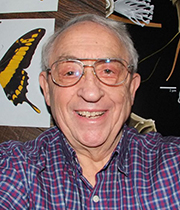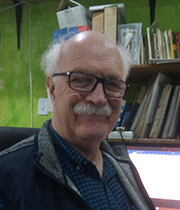KEYNOTE SPEAKERS
James W. AMRINE, Jr.
West Virginia University
Keynote title: Project for a world-wide interactive eriophyoid database

Maria NAVAJAS
French Institute of Agricultural Research (INRA)
Keynote title: Mites in a changing world
 Maria NAVAJAS is a senior scientist at the French Institute of Agricultural Research (INRA). She obtained her PhD in 1986 at the University of Montpellier II, France, majoring in Population Biology and Evolution. Completed one year postdoctoral work at the National Institute of Genetics in Mishima, Japan and invited scientist at UC-Davis (1994) and UC-Berkeley (2004). Dr Navajas’s research mainly focuses on the biodiversity and evolution of mite crop pests and their management. The emphasis is on emerging threats caused by invasive species. The team she leads at the CBGP lab in Montpellier is internationally recognized for expertise in systematics, phylogeny, ecology and evolution of spider mites. The group is currently studying plant-pest-predator interactions and adaptation in the context of Climate Smart Agriculture, funded by FACCE-ERA-NET+ (http://www.accaf.inra.fr/en/Actions-and-Projects/adaptation_animal_plant_health/GenoMite). Dr Navajas is part of the editorial and/or management board of the four main journals devoted to acarology. She serves as an expert on numerous international scientific panels and committees and has been a member since 2009 and vice-chair of the Plant Health Panel of The European Food Safety Authority.
Maria NAVAJAS is a senior scientist at the French Institute of Agricultural Research (INRA). She obtained her PhD in 1986 at the University of Montpellier II, France, majoring in Population Biology and Evolution. Completed one year postdoctoral work at the National Institute of Genetics in Mishima, Japan and invited scientist at UC-Davis (1994) and UC-Berkeley (2004). Dr Navajas’s research mainly focuses on the biodiversity and evolution of mite crop pests and their management. The emphasis is on emerging threats caused by invasive species. The team she leads at the CBGP lab in Montpellier is internationally recognized for expertise in systematics, phylogeny, ecology and evolution of spider mites. The group is currently studying plant-pest-predator interactions and adaptation in the context of Climate Smart Agriculture, funded by FACCE-ERA-NET+ (http://www.accaf.inra.fr/en/Actions-and-Projects/adaptation_animal_plant_health/GenoMite). Dr Navajas is part of the editorial and/or management board of the four main journals devoted to acarology. She serves as an expert on numerous international scientific panels and committees and has been a member since 2009 and vice-chair of the Plant Health Panel of The European Food Safety Authority.
Peter SCHAUSBERGER
University of Vienna
Keynote title: Behavioral plasticity of plant-inhabiting predatory mites shaped by early life experiences

Kosta Y. MUMCUOGLU
Hebrew University of Jerusalem
Keynote title: The influence of global warming on tick vectors
 Kosta Y. MUMCUOGLU is a senior scientist at the Parasitology Unit of the Department of Microbiology and Molecular Genetics, The Hebrew University-Hadassah Medical School, Jerusalem, Israel. He obtained his PhD on house dust mites and allergies at Basel University, Switzerland in 1975. He has been living in Jerusalem since 1983. During his entire academic career, he has worked on the biology, epidemiology, clinical significance, prophylaxis and control, as well as on the vectorial capacity, of several insects, mites and ticks of medical and veterinary importance. Since 1996 he has treated patients with chronic wounds by using maggot debridement therapy and, since 2002, has treated patients with re-attached fingers and skin grafts with the help of medicinal leeches. He was the president of the International Society of Phthiraptera and currently serves as the president of the International Society of Biotherapy. More details about his scientific activities and CV can be found at the following link:
Kosta Y. MUMCUOGLU is a senior scientist at the Parasitology Unit of the Department of Microbiology and Molecular Genetics, The Hebrew University-Hadassah Medical School, Jerusalem, Israel. He obtained his PhD on house dust mites and allergies at Basel University, Switzerland in 1975. He has been living in Jerusalem since 1983. During his entire academic career, he has worked on the biology, epidemiology, clinical significance, prophylaxis and control, as well as on the vectorial capacity, of several insects, mites and ticks of medical and veterinary importance. Since 1996 he has treated patients with chronic wounds by using maggot debridement therapy and, since 2002, has treated patients with re-attached fingers and skin grafts with the help of medicinal leeches. He was the president of the International Society of Phthiraptera and currently serves as the president of the International Society of Biotherapy. More details about his scientific activities and CV can be found at the following link:
https://medicine.ekmd.huji.ac.il/En/Publications/ResearchersPages/pages/kostasm.aspx
Hans KLOMPEN
Ohio State University
Keynote title: Higher order relationships in the Uropodina (Mesostigmata)
 Hans KLOMPEN is a professor at the Department of Evolution, Ecology and Organismal Biology at Ohio State University (OSU) in the USA. He did his M.Sc. in Biology at Radboud University, Nijmegen, The Netherlands and Ph.D at the University of Michigan, Ann Arbor, Michigan. He arrived at OSU in 1996 after postdocs at Georgia Southern University and Colorado State University. Dr. Klompen is mostly interested in mite systematics and the evolution of postembryonic development and host associations. He has worked on a variety of taxa, including Sarcoptidae, several groups of Prostigmata, and Nematalycidae, and most recently basal Parasitiformes, including ticks. His current focus is on the phylogeny and classification of Uropodina. A second area of interest is biodiversity data management. The OSU Acarology collection is now one of the largest of its kind, with nearly all specimen data available on-line. In addition, he has been the organizer of the Acarology Summer Program for the last 20 years.
Hans KLOMPEN is a professor at the Department of Evolution, Ecology and Organismal Biology at Ohio State University (OSU) in the USA. He did his M.Sc. in Biology at Radboud University, Nijmegen, The Netherlands and Ph.D at the University of Michigan, Ann Arbor, Michigan. He arrived at OSU in 1996 after postdocs at Georgia Southern University and Colorado State University. Dr. Klompen is mostly interested in mite systematics and the evolution of postembryonic development and host associations. He has worked on a variety of taxa, including Sarcoptidae, several groups of Prostigmata, and Nematalycidae, and most recently basal Parasitiformes, including ticks. His current focus is on the phylogeny and classification of Uropodina. A second area of interest is biodiversity data management. The OSU Acarology collection is now one of the largest of its kind, with nearly all specimen data available on-line. In addition, he has been the organizer of the Acarology Summer Program for the last 20 years.
Edward A. UECKERMANN
North West University
Keynote title: South African and African Acarology
 Edward A. Ueckermann retired as a researcher from the ARC-Plant Protection Research in South Africa and has been employed by the North West University, Potchefstroom, South Africa as an Extraordinary Professor since 2009. He obtained his B.Sc in 1973., majoring in Zoology and Botany, Hons.B.SC (Zoology) in 1974, M.Sc. in 1977 and D.Sc. in 1983, all at the North West University. For his D.Sc., he studied the taxonomy of the family Phytoseiidae in South Africa. In 1989 he attended the European Summer School of Acarology in Reading, England. In 1998 he attended his first International Congress of Acarology in Canberra, Australia where he was elected to the Executive Committee. Since then he has been invited: twice to the University of Florida, USA, to collaborate on citrus mites; four times by the University of Ankara, Turkey to present courses and collaborate on mite pests of tomatoes as part of an EU funded project; and three times to Israel, also to present courses. He was also one of the founding members of the African Acarology Association in 1998 and chairperson from 2007 to 2012. In 2009 and 2016 he was rated as a B2 researcher by the National Research Foundation of South Africa. Prof. Ueckermann’s scientific output is 213 peer reviewed publications and he has been the co-supervisor of 5 M.Sc. and 5 Ph.D. students. He is also on the editorial board of 5 journals and is assistant editor of Systematic and Applied Acarology. During his 40 years of service to ARC-Plant Protection Research, he had to specialise in all the agriculturally important mite families, including parasitic mites. He has rendered identification, information and training services to students, farmers, researchers and the public during that period and to the present.
Edward A. Ueckermann retired as a researcher from the ARC-Plant Protection Research in South Africa and has been employed by the North West University, Potchefstroom, South Africa as an Extraordinary Professor since 2009. He obtained his B.Sc in 1973., majoring in Zoology and Botany, Hons.B.SC (Zoology) in 1974, M.Sc. in 1977 and D.Sc. in 1983, all at the North West University. For his D.Sc., he studied the taxonomy of the family Phytoseiidae in South Africa. In 1989 he attended the European Summer School of Acarology in Reading, England. In 1998 he attended his first International Congress of Acarology in Canberra, Australia where he was elected to the Executive Committee. Since then he has been invited: twice to the University of Florida, USA, to collaborate on citrus mites; four times by the University of Ankara, Turkey to present courses and collaborate on mite pests of tomatoes as part of an EU funded project; and three times to Israel, also to present courses. He was also one of the founding members of the African Acarology Association in 1998 and chairperson from 2007 to 2012. In 2009 and 2016 he was rated as a B2 researcher by the National Research Foundation of South Africa. Prof. Ueckermann’s scientific output is 213 peer reviewed publications and he has been the co-supervisor of 5 M.Sc. and 5 Ph.D. students. He is also on the editorial board of 5 journals and is assistant editor of Systematic and Applied Acarology. During his 40 years of service to ARC-Plant Protection Research, he had to specialise in all the agriculturally important mite families, including parasitic mites. He has rendered identification, information and training services to students, farmers, researchers and the public during that period and to the present.
